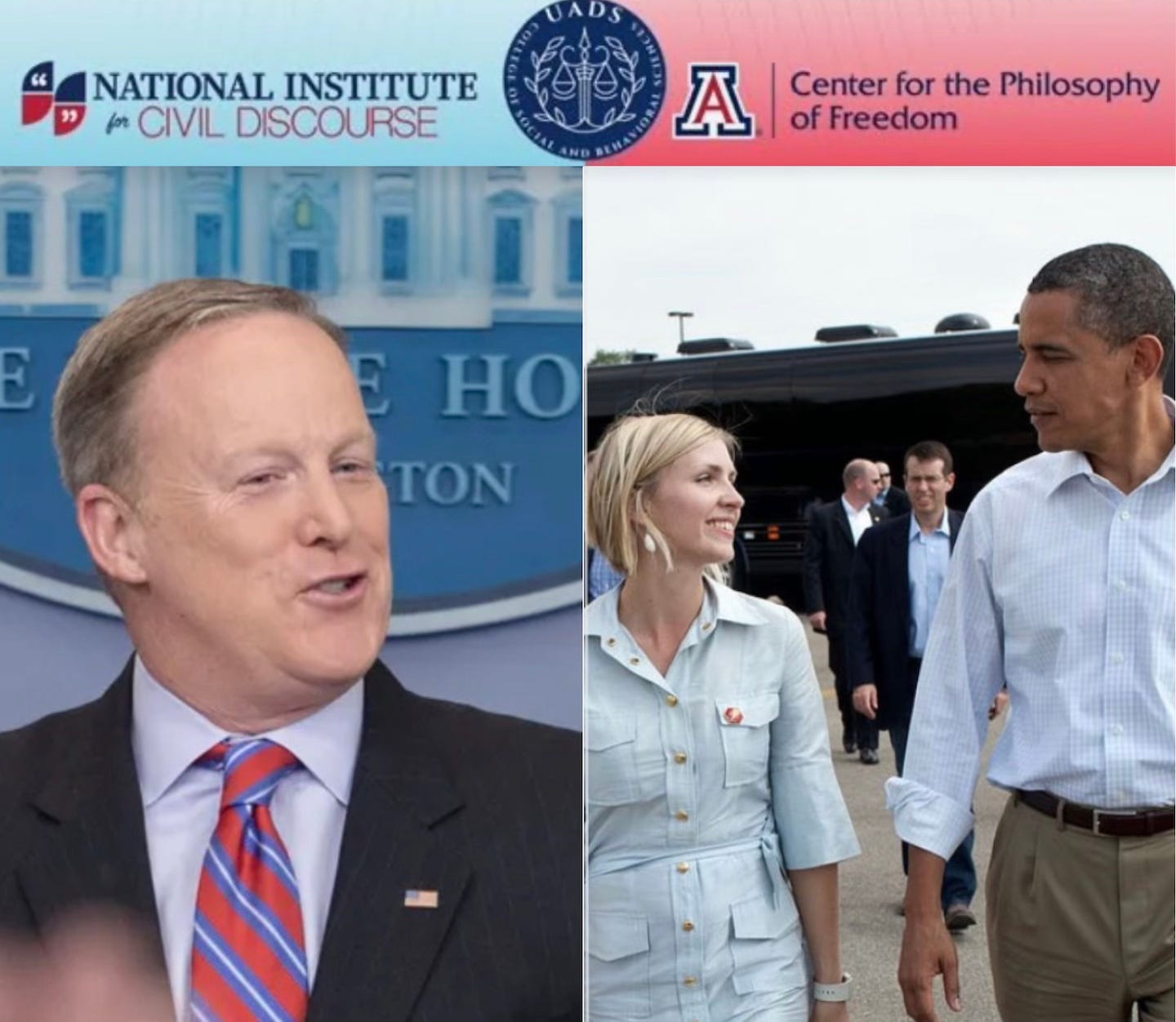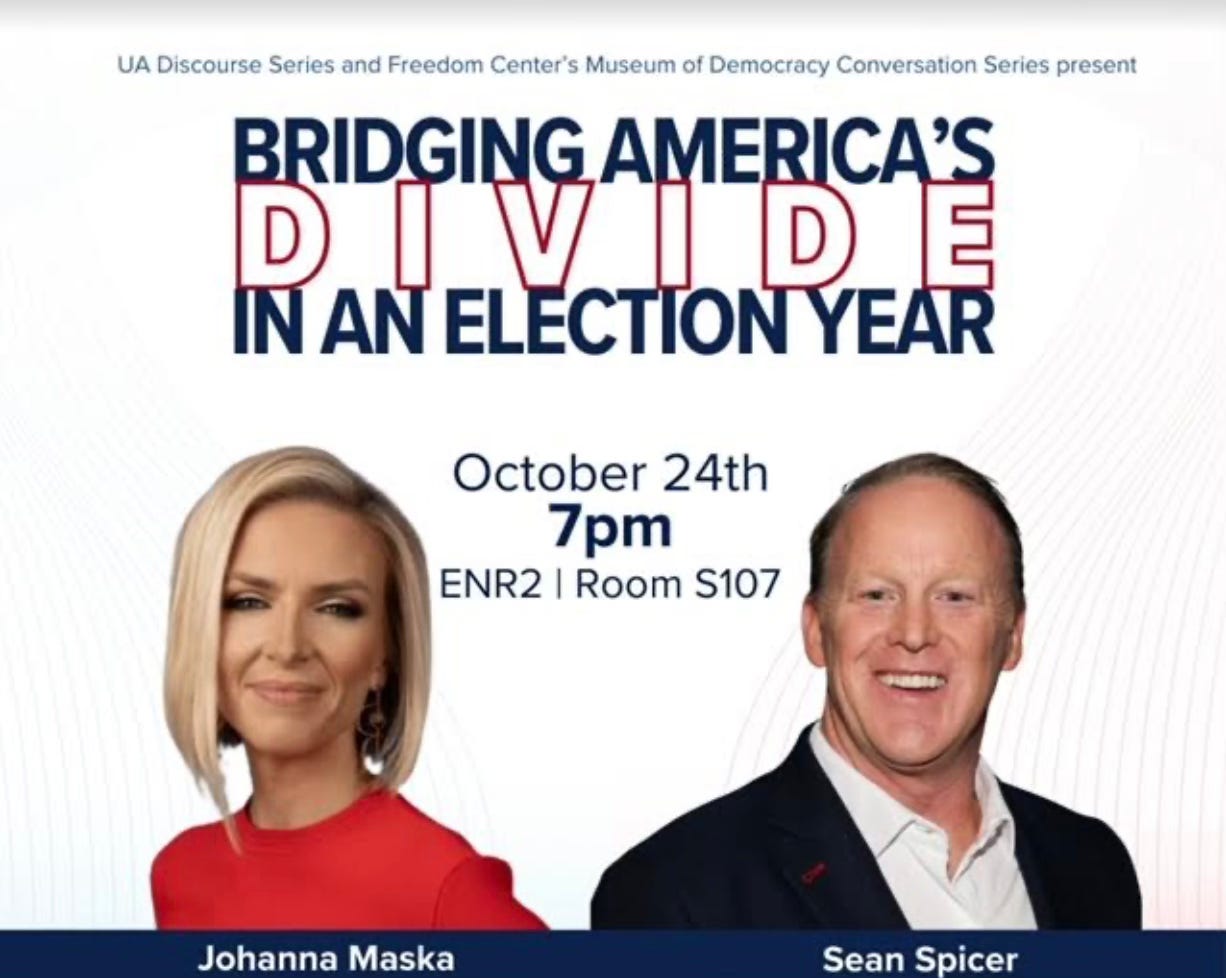How young people in a swing state see this election
In Arizona, the campaign is in overdrive, but these young voters say they’re most focused on bringing the country together.
If you’re a college student at the University of Arizona in Tucson, you’re hearing it from all sides right now. MAGA firebrands like Charlie Kirk and Tomi Lahren have visited campus. Former President Barack Obama was in town Friday.
Arizona is one of the fiercest battlegrounds in the 2024 campaign — both for the White House and the Senate seat — and every vote could matter, most especially for down-ballot races.
On Thursday, I’ll see it first hand. I’m joining Sean Spicer, former press secretary to President Trump, for a pre-election event. This conversation is designed to be different: Organizers told me that most of the political visits to campus of late have been a single party. In this one, we’re speaking together.
To prepare for the event — and get a sense of what young voters in this critical state are focused on — I spoke to four students who have been involved with the University of Arizona Discourse Series, one of the organizers of the event this week. Here are their stories.
***
Payton Hussman
Payton Hussman is a senior at the University, he grew up in Tucson, and has grown distrustful of mainstream media and traditional news sources.
"Why do you think the American people have come to value truth less over time?” Payton asks. That’s his response to a question I ask him: What would he ask the candidates if he could ask any question?
“That’s a core problem that's getting worse,” he continues. “Nobody knows what's true anymore, they only know what they feel. If it feels good to hear it, they'll say it back.”
Of where he gets his news:
"I don't go to any sources at all. I just kind of only rely on myself because today, I feel like the media, even NPR at times, the most center you can get, there's always some kind of underlying motive that I can't verify if that's changing the way they're conveying information," he says.
He watched the Presidential debates, he read the January 6 Committee’s Report. He was in the library when we were talking.
"The big thing for me is, given the evidence I'm aware of … I have come to believe that Trump would be a pretty detrimental blow to the democratic system we have, and I highly value democracy.” he said. “ I feel like Trump has demonstrated himself to be a pretty fundamental threat to that."
Payton still speaks with family members and others who disagree with him, and he believes it’s critical to do so.
His biggest fear, he says, is that people lose their ability to truly consider their options when they vote.
“That’s how democracy fails — when people aren’t willing to listen. You don’t even have to change your mind, just a willingness to listen ... And I feel like right now, depending on how crazy things get, we might realistically be on a path where that’s not an option for America anymore.”
***
Ananya Singhvi
An equal American Dream gives the world hope, Ananya Singhvi says. She won’t vote in the upcoming election because she can’t. She’s an international student from India, with a unique vantage point: Studying in a swing state during an election year.
“The whole world is watching,” Ananya says. “The whole world is looking at the policies or the ideas.” Ananya says global businesses are waiting and watching for the US to make decisions.
Ananya is an economics student. She gets her news from Economic Times of India but also a lot from social media.
“I follow social media and that's my source for news,” Ananya says. Sometimes it can be confusing to get to the truth, Ananya references local influencers who will say one person or another is good, and then post the opposite. “I don't know what to believe.”
While she can’t vote, she hopes her generation of voters in America take the time to do the research, exercise their rights. She'd like to see a large turnout of young people and women.
Watching it all, she hopes Americans remember the world will be impacted by the decisions they make.
***
Logan Brabant
“The biggest thing I’m concerned with is just the quality of politics,” Logan Brabant tells me. He’s a freshman from Montana.
"I probably would lean more conservative. I’m just not a Trump fan whatsoever,” Logan says.
Trump, he says, completely tarnishes the Republican Party and has pushed him toward the center-left.
We spoke before President Trump appeared this weekend at the Arnold Palmer Regional Airport in Latrobe, Pennsylvania. But the speech contained elements of what Logan was talking about: Most of the attention of the speech highlighted Trump’s insinuation about former golf legend Palmer’s nether region. But at the same event, Trump used coarse language to discuss Kamala Harris: “You’re a shit Vice President. The worst. You’re the worst vice president, Kamala, You’re fired. Get the hell out of here.”
I suppose that’s some of the language Logan would be referring to. And it’s not just this election cycle. For the freshman to senior class, they have been listening to this since they were children. During the pandemic, they were coming of age.
Logan feels pretty lucky to be attending the University of Arizona. He’s involved in the baseball program as an analyst and with the Discourse Series. He wants a world that lifts up all people, but one question he has for the left is why they spend so much time speaking about programs that just benefit one race or one group, while so many from all backgrounds are hurting.
Logan wants educational opportunities accessible for all. And he just wants to see people in politics treat each other with respect.
“I would like to see Trump lose and completely exit the media cycle. I think that’s probably the best thing for our country, and I think even a lot of conservatives would agree. Trump is not very healthy for the Republican Party,” he says.
***
Andrew Pongrátz
Andrew Pongrátz is a senior from Tucson. As he casts his first vote in a Presidential election, he’s been following the election very closely, getting his news from a variety of sources including The Wall Street Journal and The New York Times, both with subscriptions from his school.
Andrew is deeply concerned about poverty, inequality and housing affordability. In Tucson the price of housing has gone up but wages and jobs haven’t kept pace.
If he could ask the President one thing, he says he would ask how the United States and other partners can keep democracy alive around the world.
“My mother is from Hungary originally and grew up in Communism in the 70s and the 80s and didn't have much to eat … she remembers for 10 years in the 80s, only eating potatoes for most of their meals,” he says. Andrew feels like there’s so many who are vulnerable right now.
We discussed Venezuela — I met Hugo Chavez at the Summit of Americas in 2009 when he gave President Obama a book on how to govern. Of course Chavez would turn his country, a once vibrant democracy, into the number one plague on our immigration system, with people fleeing the poverty stricken nation.
How do you prevent that? Andrew hopes the US focuses on research and data and driving the world forward.
As for Election Day, what is Andrew hoping for? He hopes people vote and “I hope it’s boring,” he says.
Me too.
***
The University of Arizona will be livestreaming the event Sean Spicer and I will speak at; and you can expect a full wrap in my column next week.







Interesting and timely. At least not since 2008 will young voters have the potential impact that they will this election. I voted today and the lines were very long and I noticed a good number of the voters were younger. I’m used to seeing more of us gray haired folks voting early so i’m hesitantly optimistic.